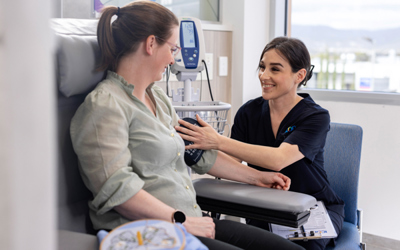What is iron deficiency anaemia?
Iron deficiency anaemia occurs when your body does not have enough iron to make a protein called haemoglobin, which is carried in your red blood cells and transports oxygen around your body.
Risk factors for iron deficiency anaemia
Iron deficiency anaemia can occur in the following ways:
Blood loss – This can occur as a result of surgery or internal bleeding. Women with heavy menstruation (blood loss due to periods), pregnant women and those post childbirth can become iron deficient
Poor iron absorption – Disorders such as Crohn’s Disease or Coeliac disease can reduce your body’s ability to absorb iron from the gut
Inadequate dietary iron intake – Vegetarian and vegan lifestyles can have an increased risk for iron deficiency due to the reduced intake of animal products rich in easily absorbable iron.
Additional causes and risk factors for iron deficiency anaemia in people with cancer include:
Certain cancer treatments – Such as radiation therapy, as well as some chemotherapy drugs can damage bone marrow tissue where blood cells are made. They can also damage the kidneys, where a hormone (erythropoietin) is made, which helps make the red blood cells in the bone marrow
Certain types of cancers – Such as bowel cancers (which can cause iron deficiency by chronic blood loss into the gut), blood/bone marrow cancers and cancers that spread to the bone marrow
Side effects of cancer and its treatment – These can often cause vomiting and nausea and poor appetite, which can result in low levels of iron in the diet.
Signs and symptoms of iron deficiency anaemia
Some people with mild iron deficiency anaemia may not notice symptoms straight away, however typical signs and symptoms include:

Pale and washed-out looking skin

Tiredness and feeling weak

Dizziness and feeling faint

Difficulty catching your breath

Pain in your chest

Headaches

Irregular heartbeat

Cold hands and feet

Pica – This is a craving for things that are not food such as dirt or paint
It is important to see your doctor if you are experiencing any of the below symptoms.
How is iron deficiency anaemia diagnosed?
Anaemia is diagnosed through a blood test, known as a full blood count. To document iron deficiency, a blood test referred to as “iron studies” will be required. This test will include a serum ferritin (the amount of total iron you have stored in your body), which will generally be low in iron deficiency.
The World Health Organisation defines anaemia as a haemoglobin level below 130g/L for men and 120g/L for non-pregnant women and iron deficiency as a serum ferritin below 30mcg/L for all adults.
In people with chronic illness, such as cancer, ferritin levels can rise because of the effect of illness or inflammation, therefore additional tests may be required to confirm a diagnosis of iron deficiency anaemia in these circumstances.
Treatment for iron deficiency anaemia
The aim of treatment is to normalise the haemoglobin level and replenish the iron stores in your body. This can be done though the following ways:
Taking oral iron supplements
Iron infusion – where iron is given intravenously (via a needle into your blood vessel)
Red blood cell transfusion – for more serious cases of iron deficiency anaemia
Increasing iron-rich sources in the diet such as lean red meat can help, but it is unlikely to restore iron levels adequately without additional treatment when anaemia is present. An important part of the management of iron deficiency anaemia is to address the cause of the problem i.e. stop blood loss for example. Additional testing may also be required to understand the cause of the iron deficiency anaemia, such as testing for gastrointestinal bleeding.




